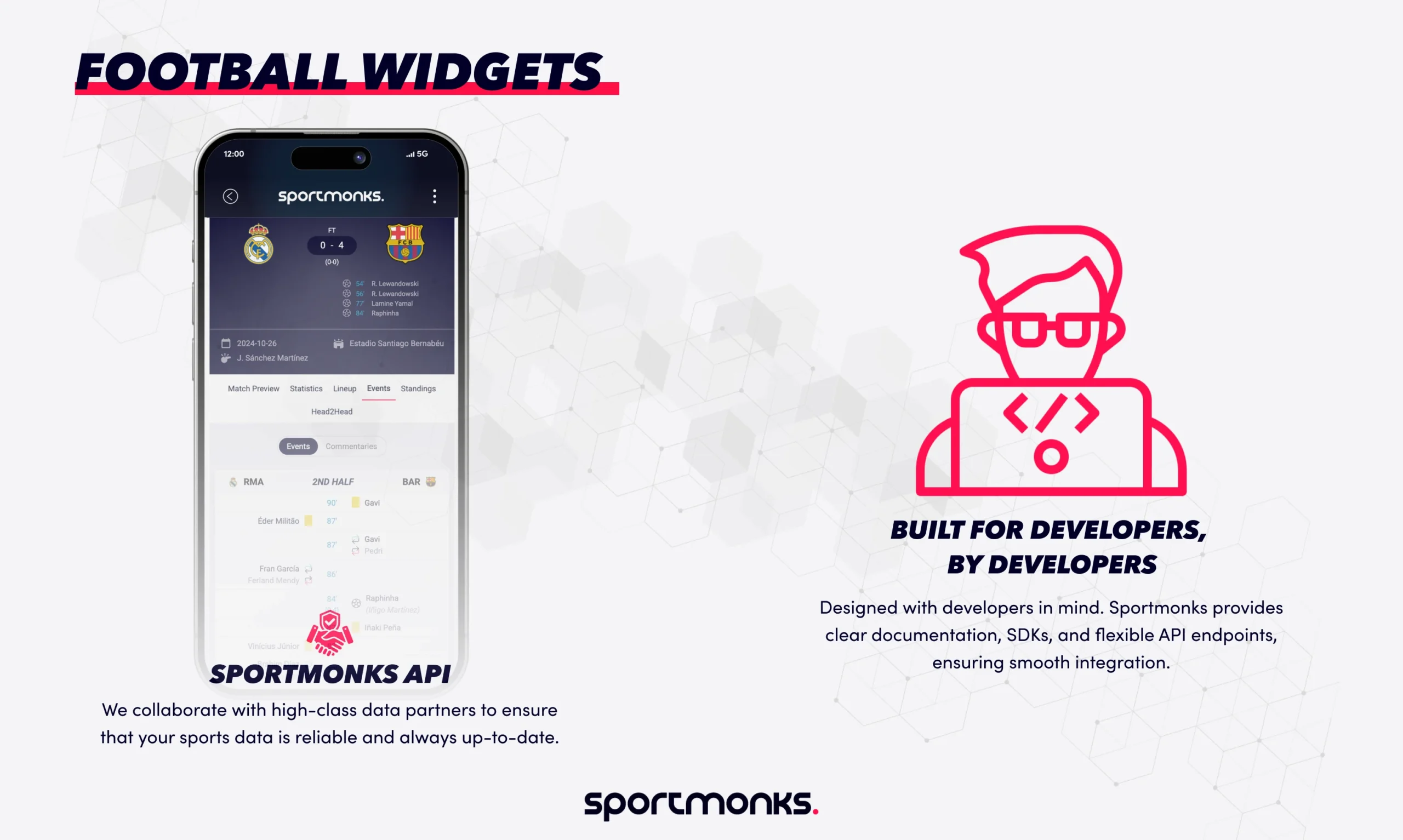
Contents
Definition of a football widgets
A football widget is an embeddable tool designed to display football data or functionality on websites or blogs. These widgets typically pull live or historical data from a central source, like an API, and present it in an easy-to-understand format. They are useful for website owners or content creators who want to add dynamic football content without building complex data systems. Common examples include live score displays, league tables, upcoming fixtures, and team statistics.
Purpose and value of football widgets
Football widgets are designed to improve the digital experience for both website owners and their audiences. They are valuable because they provide up-to-date football content with little development effort needed.
– Enriching content and engagement: The main purpose of football widgets is to add interesting and relevant content to digital platforms. Instead of just static text, users get live scores, updated tables, or real-time match events, which keeps them engaged and encourages them to stay longer.
– Driving traffic and repeat visits: By offering live, regularly updated football information, widgets give fans a reason to keep returning to a website. They become a quick source for scores or league standings, helping to build loyalty.
– Cost-effectiveness and ease of implementation: Creating custom solutions to show real-time sports data is expensive and complex. Widgets, usually provided by data suppliers, are simple to add to a site. Often, only a few lines of code are needed, saving time and money for website owners.
– Professionalism and credibility: Adding well-designed and accurate football widgets boosts a website’s professionalism and credibility. It shows that the platform is committed to providing up-to-date, relevant information.
– Monetisation opportunities: For many websites, widgets can help generate income. More traffic and engagement can lead to higher ad revenue, more premium subscriptions, or better opportunities for affiliate marketing in areas like sports betting or merchandise.
– Accessibility of information: Widgets make football data, such as a team’s current position in the league or their next match, easily accessible without needing users to visit other sports news sites.
Common types of football widgets
Football widgets come in various forms, each designed to present specific types of football data to cater to different user needs and website purposes. Some of the most common types include:
Livescore widgets
Live score widgets are the most popular, displaying real-time scores for ongoing matches, including match time, goal scorers, and sometimes in-match events like yellow cards or substitutions.
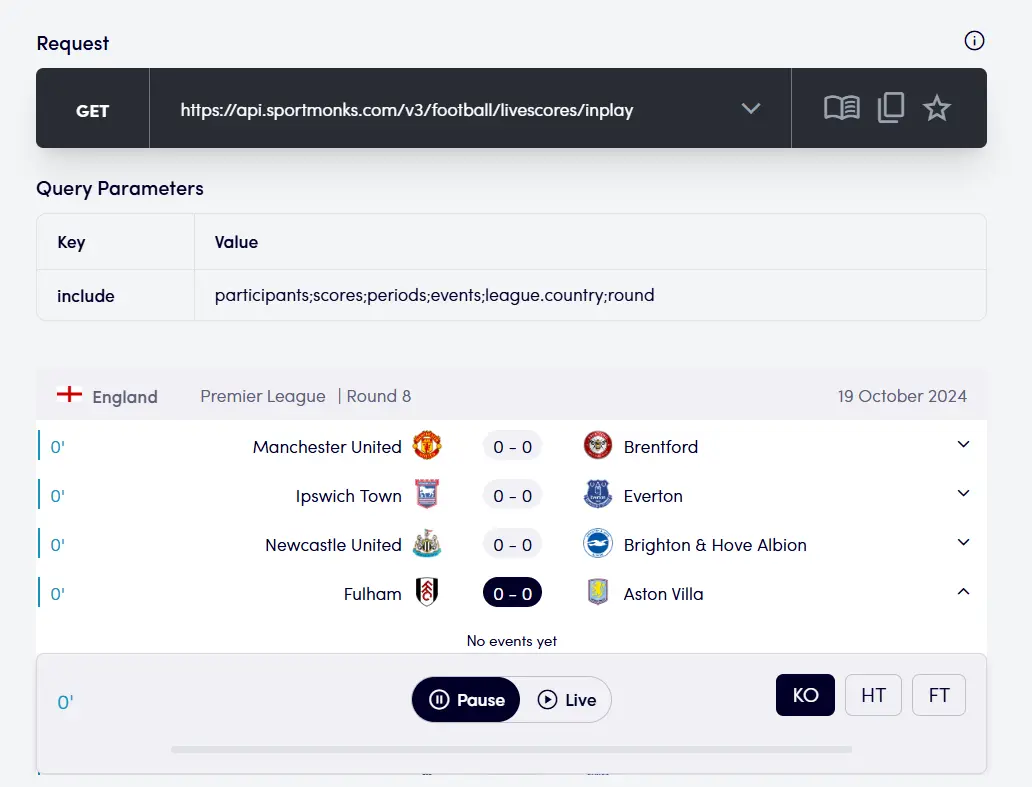
Fixture and results widget
Fixtures and results widgets show upcoming match schedules for a specific league, team, or competition, as well as historical results from past games, often including kick-off times, venues, and competition names.
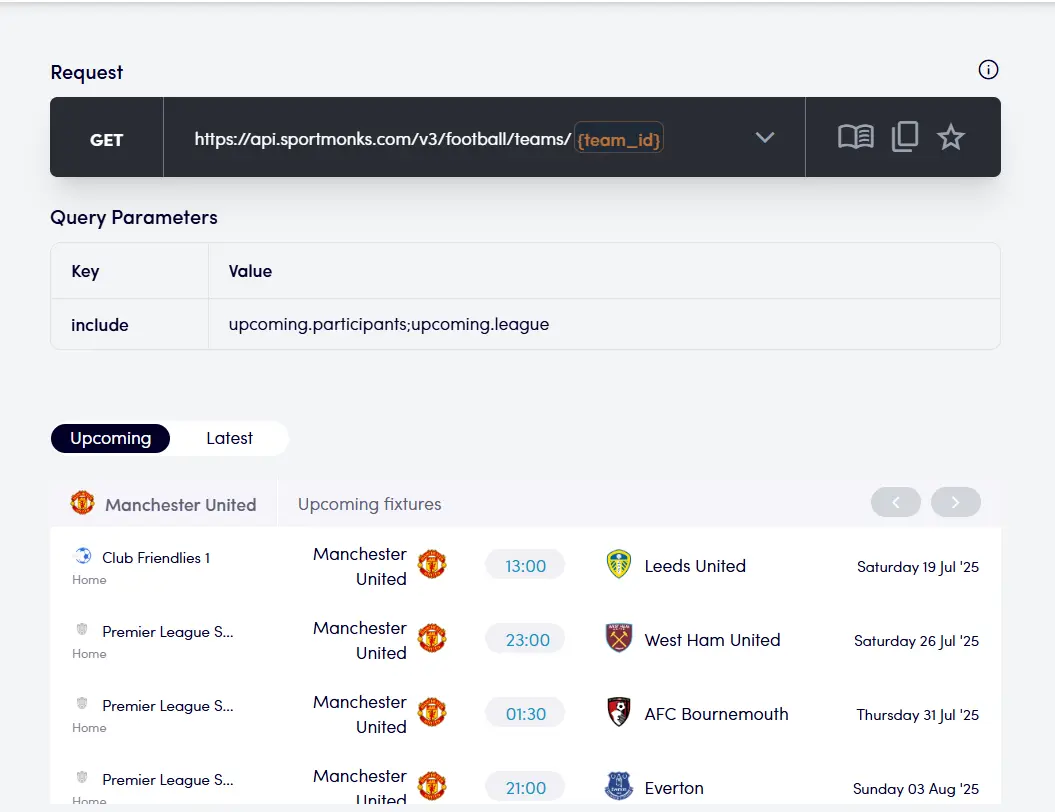
League standing widgets
League standings widgets display the current league table for a chosen competition, showing teams, their points, games played, wins, draws, losses, goals scored, goals conceded, and goal difference.

Player profile widgets
Player profile widgets focus on an individual player, showcasing their key statistics like goals, assists, appearances, biographical information, and possibly their recent form or value.
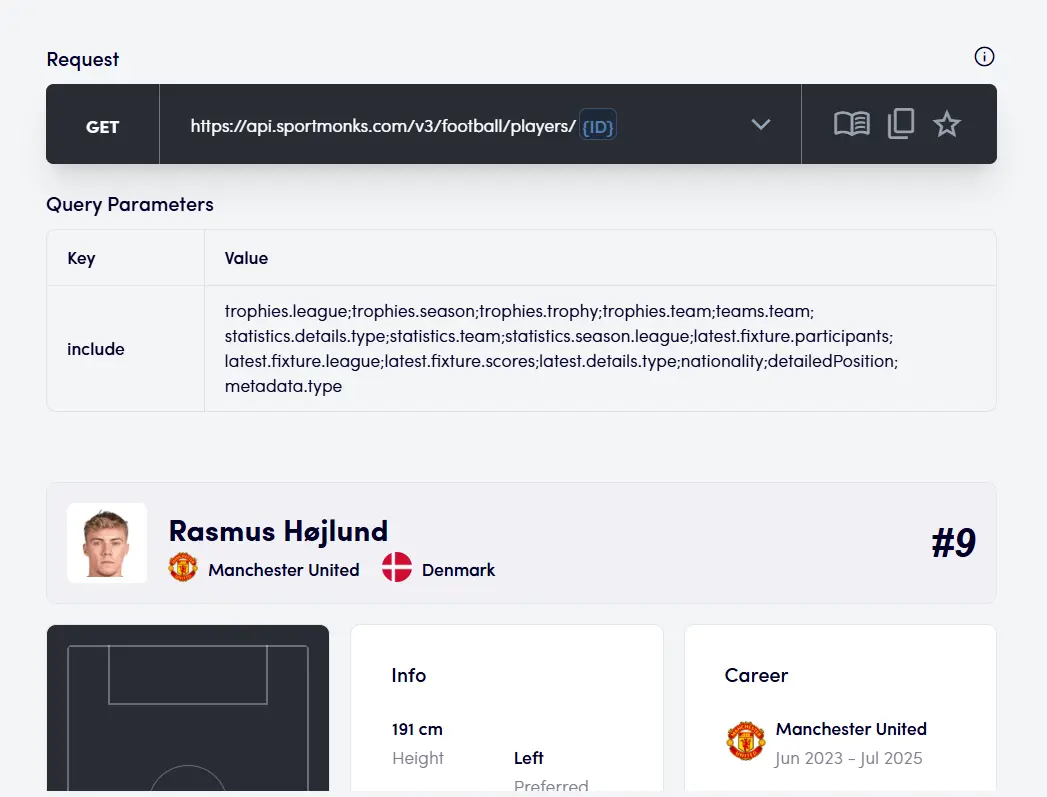
Team statistics widgets
Team statistics widgets present various statistical data for a specific team, such as average possession, shots per game, passing accuracy, defensive metrics, or expected goals (xG) over a season or recent matches.

Betting odds widgets
Betting odds widgets provide live or pre-match betting odds for various markets (e.g., match winner, over/under goals) from integrated bookmakers, allowing users to click through to place bets.
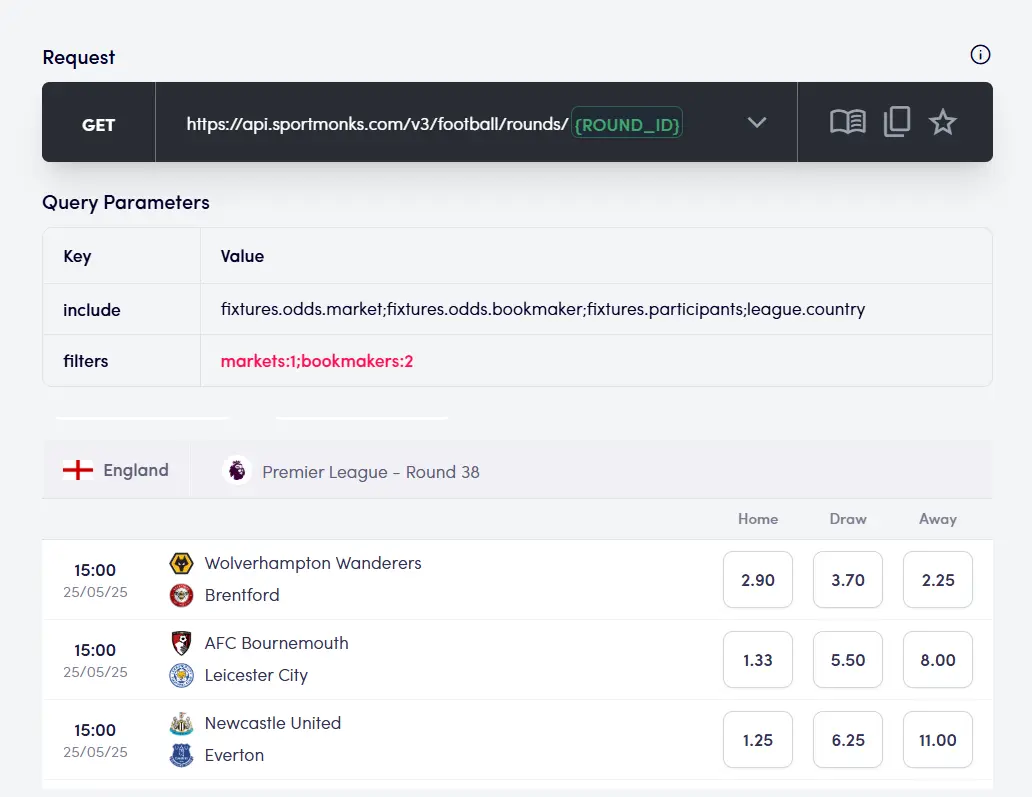
Key features and customisation options
Beyond displaying football data, football widgets often come equipped with a range of features and customisation options that improve their functionality such as
– Website owners can customise the appearance of the widget by adjusting colours, fonts, backgrounds, borders, and sometimes even the layout, such as switching between table and list views, ensuring the widget matches the site’s branding and aesthetic.
– Users or administrators can filter the data displayed by selecting specific leagues, teams, or time periods, such as showing the last 5 matches, upcoming fixtures for the next 7 days, or a full season’s standings. The widget can also show data in varying levels of detail, from just final scores to including goal scorers and yellow cards.
– For live score and commentary widgets, real-time updates are a key feature, automatically refreshing the data without the user needing to refresh the page, providing an engaging, dynamic experience.
– Many widget providers offer multi-language support, allowing websites to cater to a global audience and broaden their reach.
– Widgets are designed to be responsive, adjusting their layout and size to fit different screen sizes, from desktops to mobile phones, ensuring a consistent viewing experience.
– Some advanced widgets include interactive elements, such as clickable links to detailed statistics, player profiles, match reports, or related news, encouraging users to engage more deeply.
– Providers often offer simple embed codes in HTML or JavaScript, allowing easy integration into a website’s code, making it accessible even for those with basic web development skills.
Benefits for website owners and developers
Football widgets offer several advantages for website owners, content managers, and developers who want to add dynamic football content to their sites.
– Cost and time efficiency: Developing a system to collect, process, and display real-time football data is time-consuming and costly. Widgets provide a ready-made solution that saves development time, effort, and money, allowing owners to quickly offer rich content.
– Fresh and dynamic content: Keeping content fresh and updated can be challenging, especially with live sports. Widgets automatically update scores, standings, and news, ensuring the site always offers relevant information without manual work.
– Increased user engagement and retention: Interactive, real-time content keeps visitors engaged longer and encourages them to return. Fans are more likely to visit regularly if the site offers instant updates and detailed information without needing to go elsewhere.
– Professionalism and credibility: Adding high-quality, accurate, and visually appealing widgets boosts a website’s professionalism. It shows that the platform is reliable and committed to providing up-to-date sports information, which builds trust with users.
– Reduced maintenance overhead: The widget provider manages and maintains the data, so website owners don’t have to worry about sourcing, cleaning, or maintaining data, allowing them to focus on their core work.
– Monetisation opportunities: More traffic and engagement from appealing widgets can create monetisation opportunities, such as higher ad revenue, more affiliate marketing income, or increased subscriptions for premium content.
– Scalability and reliability: Trusted widget providers have reliable, scalable systems that can handle large traffic spikes during major events. This ensures that the content remains accessible and performs well, even during busy periods
Benefits for end-users/fans
Football widgets offer several advantages for fans, making it easier and more enjoyable to follow the sport:
– Instant access to information: Fans can get instant updates on live scores, league standings, and upcoming fixtures without leaving the website they are on. This saves time and gives quick, easy-to-see information.
– Convenience and centralisation: Widgets bring football data directly to various websites (e.g., news sites, fan forums, blogs). Fans can access key details from different sources without needing to visit multiple sports websites.
– Enhanced engagement: Dynamic widgets, especially those with real-time updates or interactive features, make following a match or league more exciting. They create a sense of urgency and thrill, even if the fan isn’t watching the game live.
– Personalised content: Many widgets let fans customise what they see, so they can follow their favourite team or league, making the content more relevant and valuable to them.
– Contextual understanding: When placed in articles or blog posts, widgets give immediate context. For example, a league table widget next to an article on a team’s promotion chances shows their current position and points gap.
– Improved user experience: Well-designed widgets are easy to use and visually appealing, presenting complex data in a clear way, making browsing smoother and more enjoyable.
– No additional software required: Fans don’t need to download any special apps or plugins. The widget simply loads with the webpage, making it accessible to anyone using a standard web browser.
Sportmonks’ widgets
Sportmonks offers a comprehensive suite of football widgets designed to seamlessly integrate dynamic, real-time football data into websites and applications. These widgets are ideal for content creators, sports media outlets, and developers seeking to enhance user engagement with minimal development effort.
Key widget categories
- Livescore and event widgets: Provide real-time updates on ongoing matches, including scores, match events, and team lineups. The match centre widget offers detailed match statistics, trends, commentaries, and lineups, delivering an immersive experience for users.
- Odds and prediction widgets: Deliver live or pre-match betting odds for various markets (e.g., match winner, over/under goals) from integrated bookmakers, allowing users to click through to place bets.
- Expected goals (xG) widgets: Provide advanced metrics such as Expected goals (xG) and expected assists (xA) through the /expected endpoints. These metrics estimate the quality of scoring opportunities and assist potential, offering a deeper understanding of a team’s attacking efficiency and creativity.
- Schedules and results widgets: Display upcoming match schedules for a specific league, team, or competition, as well as historical results from past games, often including kick-off times, venues, and competition names.
- Statistics widgets: Present various statistical data for a specific team, such as average possession, shots per game, passing accuracy, defensive metrics, or expected goals (xG) over a season or recent matches.
- Historical data widgets: Offer insights into past performances, trends, and patterns, allowing users to analyse historical data for teams, players, and competitions.
- Standings data widgets: Display the current league table for a chosen competition, showing teams, their points, games played, wins, draws, losses, goals scored, goals conceded, and goal difference.
To interact with these widgets, head over to my.sportmonks.com and sign in/up
Elevate your website with football widgets powered by Sportmonks’ API
Transform your application by creating customised football widgets using the Sportmonks football API. Display live scores, detailed league standings, upcoming fixtures, player stats, and even advanced metrics like expected goals (xG) on your digital platform.
With Sportmonks’ flexible and powerful API, you have full control over data integration, allowing you to build engaging, interactive widgets tailored exactly to your needs. Enhance user engagement, increase repeat visits, and deliver professional-quality football content effortlessly.
Start your free trial today and bring dynamic football insights directly to your audience.